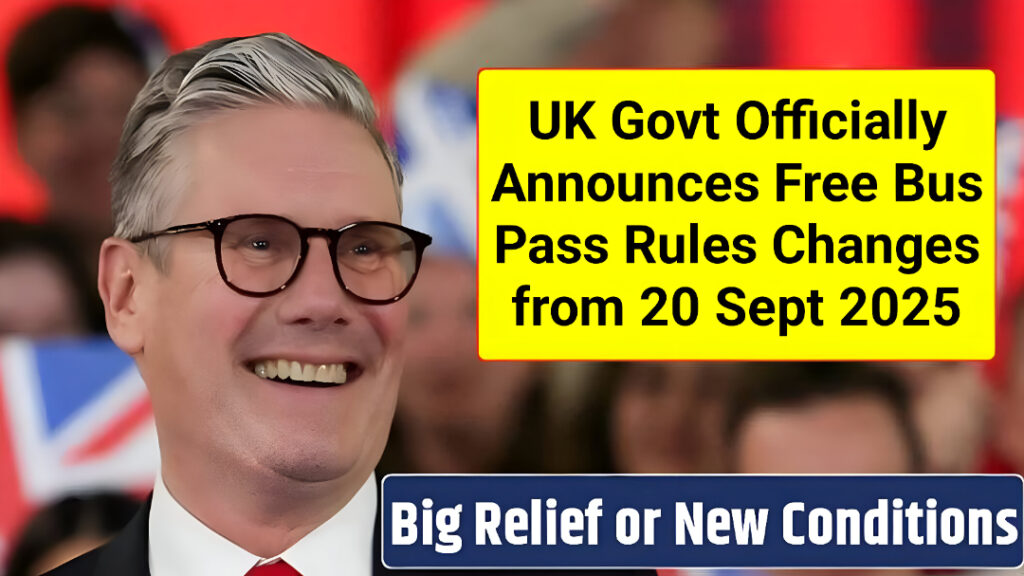UK Free Bus Pass Rules September 2025: The UK government has officially confirmed new changes to free bus pass rules effective from 20 September 2025. Millions of pensioners, disabled citizens, and low-income households rely on concessionary travel, making this announcement both crucial and widely debated. While the scheme promises some much-needed relief, it also raises questions about whether new conditions might affect eligibility. For many, this is more than just free travel—it’s about independence, financial security, and access to essential services.
Why Free Bus Passes Are So Important
Free bus passes are more than a convenience; they are a lifeline for older people and vulnerable groups. They enable pensioners to attend medical appointments, shop for essentials, and stay socially active without worrying about transport costs. For those on limited incomes, the bus pass offers financial stability, while also contributing to community engagement and reducing isolation. The government recognises that maintaining affordable public transport is vital for both individual wellbeing and national social cohesion.
What the Government Announced for 20 September 2025
From 20 September 2025, updated rules will govern how free bus passes are issued and used. The government has clarified that the scheme will continue nationwide, but with certain adjustments to eligibility criteria and travel hours in some regions. Officials say the aim is to ensure long-term sustainability of the programme while keeping it fair and accessible. This announcement marks one of the most significant updates in years, directly affecting millions of daily bus users.
Who Will Benefit from the New Rules
The changes are expected to benefit pensioners, disabled citizens, and low-income individuals who depend on buses for essential travel. The government has promised that no current eligible pensioner will lose their pass, which provides reassurance to older households. In fact, officials suggest that in some areas the scheme may be extended to more people, offering wider coverage and improved accessibility. For many, this feels like a victory after years of campaigning to protect concessionary travel rights.
Possible New Conditions Under the Scheme
Despite the relief, concerns remain about whether new conditions will limit usage. Reports suggest that certain regions may introduce restrictions on peak-hour travel to reduce costs and overcrowding. Some local councils are also reviewing funding allocations, which could result in minor adjustments to how and when passes are used. While the government insists no pensioner will lose access, advocacy groups are monitoring closely to ensure that the changes don’t unintentionally disadvantage the most vulnerable.
Impact on Pensioners and Disabled Citizens
For pensioners, the free bus pass is not only a cost-saving tool but also a key to independence. Many older adults rely on buses for their daily routines, from visiting family to accessing healthcare. Disabled citizens also view the scheme as essential for mobility and equality. The new rules must therefore balance financial sustainability with accessibility. Advocacy groups argue that any restriction, even on travel times, should not compromise the dignity and freedom of these groups.
How to Check Eligibility After the Changes
Pensioners and disabled citizens will need to check their eligibility under the new guidelines. Local councils are expected to provide updated information on who qualifies, how to apply, and what documents are required. In most cases, current pass holders will see automatic renewals without disruption. For new applicants, simplified online and postal systems will make it easier to apply, while in-person assistance will remain available for those less comfortable with digital processes.
Government’s Financial Justification
The government has defended the changes by citing the rising cost of maintaining free travel nationwide. With an ageing population and growing demand, officials argue that adjustments are necessary to keep the scheme sustainable for future generations. By introducing minor conditions rather than cutting the programme, the government claims it is protecting pensioners while ensuring public funds are used responsibly. This approach is seen as a compromise between financial reality and social responsibility.
Public and Advocacy Group Reactions
Reactions to the announcement have been mixed. Pensioners’ associations and disability groups have welcomed the continuation of the scheme but remain cautious about possible restrictions. Some campaigners argue that free bus travel should be expanded further to support struggling households during the cost-of-living crisis. Meanwhile, local councils are pushing for more government funding to cover the rising demand. Overall, the announcement has sparked nationwide debate, highlighting just how important bus passes are to everyday life.
Comparison with Previous Rules
Previously, free bus passes were issued with relatively straightforward eligibility, but funding pressures often led to regional variations. Some councils restricted usage to off-peak hours, creating confusion and inconsistency across the UK. The new rules aim to provide more clarity and fairness, although regional discretion remains a factor. By standardising the policy where possible, the government hopes to reduce uncertainty and strengthen public confidence in the scheme.
Looking Ahead – The Future of Free Travel
The announcement has reignited discussions about the future of free travel in the UK. With climate concerns and cost-of-living pressures, many believe concessionary travel should be expanded rather than restricted. The government has hinted at further reviews in 2026, which could see more digital bus passes, integration with rail discounts, or even expanded eligibility. For now, pensioners and vulnerable citizens can breathe a sigh of relief knowing that free bus passes remain a protected benefit.
Conclusion
The UK government’s announcement on free bus pass rule changes from 20 September 2025 offers both relief and caution. While the continuation of the scheme reassures millions of pensioners and disabled citizens, the possibility of new conditions raises important questions about accessibility and fairness. What remains clear is that free bus passes are a vital social lifeline, and protecting them is crucial for dignity, independence, and equality. The coming months will show whether the government’s balancing act truly meets the needs of those who depend on it most.
